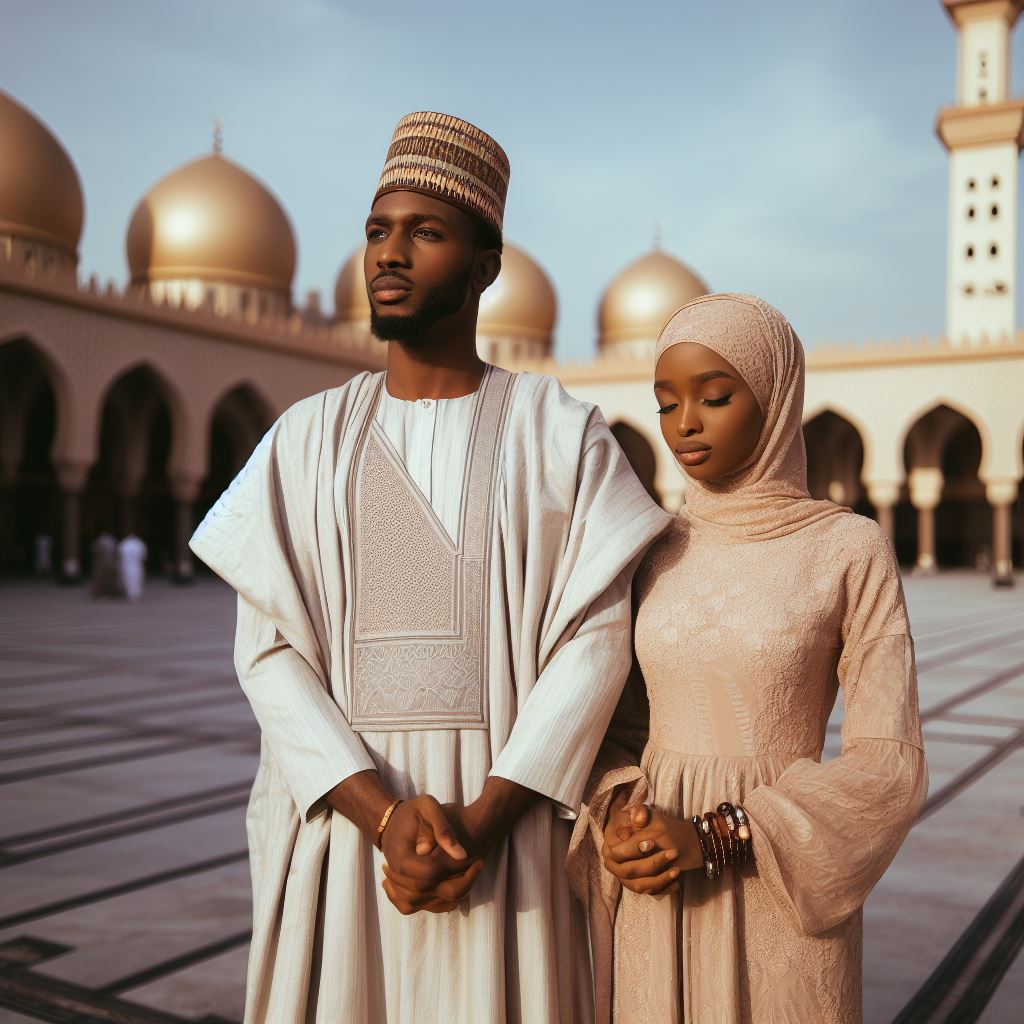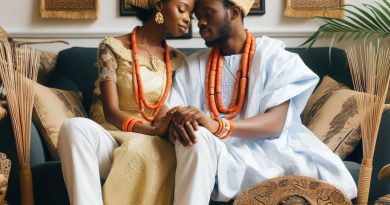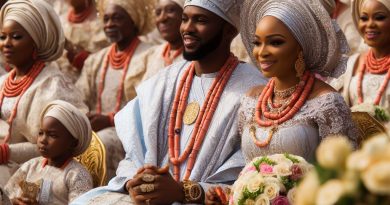A Comparative Analysis: Marriage Duas vs. Love Spells
Last Updated on January 29, 2024
Introduction
In Nigerian culture, the concept of ‘Marriage Duas vs Love Spells’ holds significant importance, symbolizing unity, family values, and societal stability.
A comparative analysis will be conducted to explore the differences between marriage duas and love spells.
This blog post aims to shed light on the contrasting approaches in seeking love and marriage blessings.
Marriage is deeply rooted in Nigerian culture, serving as a cornerstone of society.
It unites individuals, families, and communities, ensuring continuation of bloodlines and cultural traditions.
Elaborate ceremonies, traditional rituals, and dowry exchanges highlight the significance of marriage.
Now, let’s delve into the topic at hand – comparing marriage duas and love spells.
Marriage duas are fervent supplications to seek blessings and guidance from the Almighty, asking for a compatible and harmonious partner.
This approach focuses on prayers and maintaining a strong connection with God throughout the process of finding a suitable spouse.
On the other hand, love spells are more associated with supernatural forces and spells cast by practitioners to manipulate feelings, desires, and actions.
People believe love spells actively control others’ free will, fostering affection or attraction between two people.
The purpose of this blog post is to educate readers about the different methods used in seeking love and marriage in Nigerian culture.
By understanding the contrasts between marriage duas and love spells, individuals can make informed decisions and respect cultural traditions when seeking love and lifelong partnerships.
Basically, marriage plays a vital role in Nigerian culture and is a significant milestone in people’s lives.
By exploring the differences between marriage duas and love spells, this blog post aims to provide insights into the diverse approaches taken to find love and blessings in marriage.
Read: Authentic Sources for Marriage Duas: A Scholarly View
Marriage Duas: Enhancing Successful Marriages
Marriage Duas hold a significant place in Islamic tradition, serving as powerful supplications to seek blessings for matrimony.
In Nigeria, cultural and religious practices deeply root these prayers, emphasizing the significance of a harmonious union.
Definition and Explanation of Marriage Duas in Islamic Tradition
Marriage Duas, also known as prayers, are devout expressions seeking divine intervention and guidance for a successful marriage.
Believers actively seek Allah’s blessings for lifelong companionship, using these supplications to connect with Him.
The Cultural and Religious Significance of Marriage Duas in Nigeria
In Nigeria, where Islam holds great influence, marriage duas are of tremendous cultural and religious importance.
They reflect the local customs and beliefs associated with matrimony.
These prayers are performed during wedding ceremonies and signify a commitment to a prosperous married life.
The Process of Performing Marriage Duas
Performing marriage duas involves a ritualistic process that emphasizes devotion and spirituality.
The supplicant engages in a state of purity, facing the Qibla (the direction of the Kaaba in Mecca), reciting specific verses, and pleading for matrimonial blessings.
Examples of Common Marriage Duas Used in Nigeria
Nigeria’s rich cultural heritage has led to the formation of diverse marriage duas that exhibit varying regional influences.
Examples include dua for love and compassion between spouses, dua for fertility and healthy offspring, and dua for protection against evil influences.
Beliefs and Expectations Associated with Marriage Duas
People believe marriage duas strengthen bonds, resolve conflicts, enhance love, commitment, and protect unions from external influences.
Analysis of the Effectiveness and Limitations of Marriage Duas
Marriage duas have been regarded as effective tools in fostering successful marriages.
The deep faith associated with these supplications instills a sense of responsibility and commitment in couples.
However, it is crucial to acknowledge that marriage duas alone cannot guarantee a harmonious relationship, as other factors like communication and understanding are equally essential.
Generally, marriage duas hold substantial cultural and religious significance in Nigeria.
They encompass a deep spiritual connection with Allah, seeking His blessings for a prosperous married life.
Couples must understand that, for a successful marriage, they should complement prayers with effective communication and other crucial elements.
Read: Best Times and Conditions to Recite Your Marriage Duas
Gain More Insights: From Pre-Wedding to Post-Honeymoon: Books for Every Stage
Love Spells
Definition and explanation of love spells in African traditional beliefs
Love spells are rituals or incantations performed in African traditional beliefs with the aim of attracting love or influencing the feelings of a specific person towards the spell-caster.
Cultural and historical context of love spells in Nigeria
Love spells have a long-standing history in Nigerian culture, deeply rooted in traditional beliefs and practices.
They are often influenced by spiritual and mystical traditions passed down through generations.
Love spells, embedded within the African traditional beliefs, hold a significant role in Nigerian culture.
These spells serve as a form of spiritual intervention to influence love and attract desired romantic partners.
The belief in the power of love spells is deeply ingrained in the cultural and historical context of Nigeria.
The process of casting love spells
The process of casting love spells involves a range of rituals, incantations, and ingredients.
Spell-casters follow specific instructions, combining elements such as herbs, candles, and personal belongings to enhance their intentions.
These rituals are believed to channel energy and direct it towards the desired outcome.
Common love spells used in Nigeria
There are various types of love spells used in Nigeria, each serving a unique purpose.
Some love spells aim to attract a specific person, while others focus on enhancing existing relationships.
People often seek love spells to reignite passion or recover lost love, obtaining them from traditional healers, spiritual leaders, or online sources.
Beliefs and expectations associated with love spells
When it comes to beliefs and expectations associated with love spells, many Nigerians place significant faith in their power.
People believe love spells forge strong bonds, deepen affection, and can even lead to marriage, overcoming obstacles for desired romance.
Effectiveness and limitations of love spells in promoting successful marriages
However, it is important to approach love spells with caution.
While some individuals claim to have experienced positive results, the effectiveness of love spells in promoting successful marriages is debatable.
Love spells cannot address underlying issues or guarantee long-lasting love.
They should be seen as a spiritual aid, complementing sincere efforts in building and maintaining relationships.
Essentially, love spells hold a significant place in African traditional beliefs, particularly in Nigeria.
They are deeply intertwined with the cultural and historical context and have unique rituals and practices.
While love spells may generate hope and provide temporary relief, it is crucial to approach them with a realistic perspective.
True love and successful marriages are built on genuine connections, communication, and understanding, surpassing any supernatural intervention.
Read: Gender-Specific Marriage Duas: What Men and Women Say

Comparative Analysis
Comparison of the Purpose and Intentions behind Marriage Duas and Love Spells
People use marriage duas for blessings and guidance in happy marriages. Love spells manipulate feelings and emotions.
Similarities and Differences in the Rituals and Practices of Marriage Duas and Love Spells
Typically, people recite specific prayers and supplications for marriage by invoking Quranic verses or religious texts.
On the other hand, love spells involve the use of charms, potions, or incantations to influence the emotions and actions of the desired person, often with the intent to make them fall in love or stay committed.
Both practices involve a belief in spiritual intervention, yet marriage duas emphasize divine guidance and blessings, while love spells focus more on manipulating someone’s feelings.
Cultural and Social Implications of Relying on Marriage Duas and Love Spells for Marital Happiness
Relying solely on marriage duas and love spells can have significant cultural and social implications.
In some cultures, the use of marriage duas is considered a common practice, rooted in deeply held religious beliefs.
It provides a sense of hope and faith in the divine, promoting a stronger marital bond.
However, the reliance on love spells can have negative consequences.
It can foster unhealthy and manipulative relationships, disregarding the free will and autonomy of individuals involved.
Long-term Impact of Marriage Duas and Love Spells on Relationships and Marriages
Marriage duas can create a positive impact on relationships by fostering a sense of spirituality and mutual support.
They can contribute to a stronger emotional connection and enhance communication between partners.
In contrast, love spells can lead to a false sense of attraction and attachment, which may eventually fade away.
Such spells may ultimately damage relationships, as they are built on manipulation rather than genuine feelings.
Ethical Considerations of Using Marriage Duas and Love Spells as Interventions in Relationships
Using marriage duas as an intervention in relationships is generally considered ethical.
It involves seeking divine blessings and guidance, which aligns with religious practices.
On the other hand, love spells raise ethical concerns as they infringe upon individual autonomy and manipulate emotions without consent, potentially causing harm to all parties involved.
Personal Opinion on the Effectiveness and Appropriateness of Marriage Duas and Love Spells
In my opinion, marriage duas can be effective in promoting marital happiness as they rely on spirituality and the power of prayer.
They encourage personal growth and nurture a deeper connection between partners.
On the other hand, love spells are inappropriate and ineffective as they disregard consent and manipulate feelings.
Genuine relationships should be built on trust, mutual respect, and free will.
In general, a comparative analysis of marriage duas and love spells reveals significant differences in their purpose, rituals, and impact on relationships.
While marriage duas can enhance a relationship, love spells can be destructive and unethical.
It is essential to prioritize healthy communication, mutual respect, and genuine emotions in seeking marital happiness.
Read: Stories of Success: Real-Life Impact of Marriage Duas
Learn More: How Traditional Nigerian Ceremonies Honour the Institution of Marriage
Conclusion
In this blog post, we have explored the concept of marriage duas and love spells, and conducted a comparative analysis between the two.
Marriage duas, firmly rooted in Islamic beliefs, actively seek Allah’s blessings and guidance for marital success.
On the other hand, love spells are based on the idea of manipulating someone’s feelings to create a desired outcome.
Through our analysis, we have identified some key differences between marriage duas and love spells.
Marriage duas emphasize the importance of trust, communication, and mutual understanding in a relationship.
They promote a spiritual connection between spouses and encourage them to work together to overcome challenges.
In contrast, love spells rely on external forces and attempt to control the emotions and actions of individuals without their consent.
These spells can be seen as manipulative and may lead to an unhealthy and unsustainable relationship.
In a nutshell, it is essential for individuals to reflect on their own beliefs and practices regarding marriage and relationships.
While some may find solace in marriage duas and the spiritual aspect of their faith, others may opt for different approaches.
It is crucial to prioritize respect, consent, and open communication in any relationship, regardless of one’s beliefs.
As readers, we encourage you to explore your own beliefs and practices surrounding marriage and relationships in Nigeria.
Engage in open discussions with your partner, seek advice from trusted sources, and consider the values that resonate with you.
By understanding and prioritizing the foundations of a healthy and sustainable relationship, we can work towards building fulfilling marriages and fostering strong bonds in our communities.


